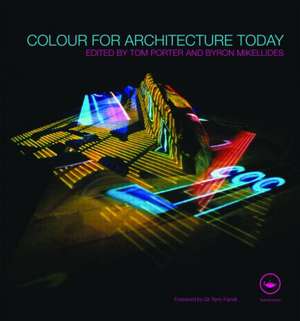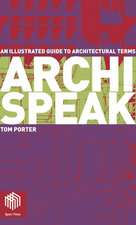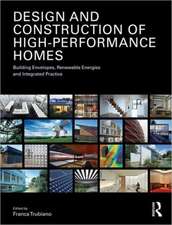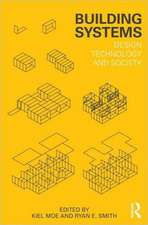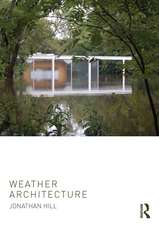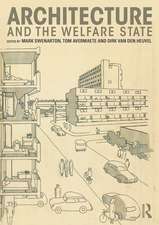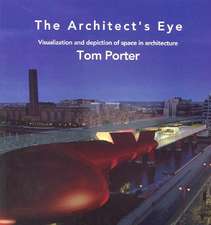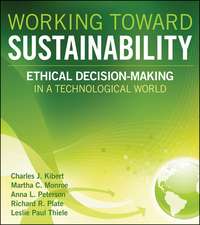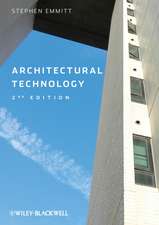Colour for Architecture Today
Editat de Tom Porter, Byron Mikellidesen Limba Engleză Paperback – 16 dec 2008
Combining real examples from practice with colour theory, this book will help you to fully understand the role and impact of colour in our urban spaces. Contributions from leading architects Will Alsop, Legorreta and Legorreta, John Outram, Sauerbruch Hutton and Neuterlings Riedijk accompany those from artists Alain Bony and Yann Kersalé, and from colour researchers such as Kristina Enberg and Anders Hård, who developed the Natural Colour System. Topics include:
- how and why we see colour
- methodologies in the documentation of traditional colours
- the development of new urban palettes
- recent colour psychology research
- the effect of light levels on human behaviour
- dramatic colour effects achievable with light
- guidelines for future deployment of colour in the built environment.
| Toate formatele și edițiile | Preț | Express |
|---|---|---|
| Paperback (1) | 332.87 lei 43-57 zile | |
| Taylor & Francis – 16 dec 2008 | 332.87 lei 43-57 zile | |
| Hardback (1) | 1020.84 lei 43-57 zile | |
| Taylor & Francis – 16 dec 2008 | 1020.84 lei 43-57 zile |
Preț: 332.87 lei
Preț vechi: 426.14 lei
-22% Nou
Puncte Express: 499
Preț estimativ în valută:
63.71€ • 69.23$ • 53.56£
63.71€ • 69.23$ • 53.56£
Carte tipărită la comandă
Livrare economică 21 aprilie-05 mai
Preluare comenzi: 021 569.72.76
Specificații
ISBN-13: 9780415438155
ISBN-10: 0415438152
Pagini: 192
Ilustrații: 100 colour illustrations, 15 black & white line drawings
Dimensiuni: 224 x 238 x 13 mm
Greutate: 0.61 kg
Ediția:Revizuită
Editura: Taylor & Francis
Colecția Taylor & Francis
Locul publicării:Oxford, United Kingdom
ISBN-10: 0415438152
Pagini: 192
Ilustrații: 100 colour illustrations, 15 black & white line drawings
Dimensiuni: 224 x 238 x 13 mm
Greutate: 0.61 kg
Ediția:Revizuită
Editura: Taylor & Francis
Colecția Taylor & Francis
Locul publicării:Oxford, United Kingdom
Public țintă
Professional and UndergraduateCuprins
Introduction Part 1: Why and How We See Colour 1. The Colour Currency of Nature 2. Seeing Colours 3. The Dynamics of Colour Part 2: Colour Mapping: Colour at the City Scale 4. Light, Locale and the Color of Cities 5. Italian City Colour Plans (1978–2007) 6. Unity in Diversity at Kirchsteigfeld, Potsdam 7. The Geography of Colour 8. Digital Colour Mapping Part 3: The NCS (Natural Color System) and Research Applications 9. NCS – the Natural Color System for the Denotation of Colour 10. Perceived and Inherent Colour: Comparing the Colour of External Façades with Colour Samples 11. Seven Kinds of Colour 12. Daylight Influence on Indoor Colour Design 13. The Longyearbyen Project: Approach and Method Part 4: Architects and Colour at the Building Scale 14. Color Structure: A Perceptual Techtonic 15. The Globalization of Colour 16. Evoking a Response 17. On Colour and Space 18. Iconic Engineering: Reflections on the Subject of Colour in Architecture, Ornament and City Planning 19. Code, Space and Light 20. The Illusive Façade 21. Colour 22. The Colour of Money (It Doesn’t Matter) Part 5: Colour Psychology and Colour Aesthetics 23. Colour Preference: The Longitudinal Perspective 24. Preferences for Colours on Buildings 25. Colour, Arousal, Hue-Heat and Time Estimation 26. Colour Synaesthesia: Seeing Sound and Hearing Colour 27. Light, Mood and Seasonal Disorders Part 6: Into the Light 28. Being in Colour 29. Architectural Light and Colour as a Source of Inspiration: An Approach to the Use of Colour 30. New 42nd Street, New York 31. The Fisherman of Light
Notă biografică
Tom Porter is an author, lecturer and colour consultant. He is Visiting Professor at Montana State University and Visiting Fellow at Oxford Brookes University
Byron Mikellides is Professor at the School of Architecture at Oxford Brookes University
Byron Mikellides is Professor at the School of Architecture at Oxford Brookes University
Descriere
This book argues for a greater use of colour in our built environment on grounds of both aesthetic appeal and human need; colour plays a vital role in ensuring a widely experienced existence. The authors’ arguments for a wider use of colour are supported by invited contributions from leading architects and designers.
